Intel Rocket Lake-S vs AMD Ryzen 5000: Which should you buy? - terrellfolody

Soak Schultz / IDG
AMD versus Intel. Ryzen versus Essence. Over the past a few old age, the 2 chip giants have been going toed-to-toe. This round pits AMD's powerhouse desktop Ryzen 5000 chip (represented by the Ryzen 5900X) versus Intel's new 11th-gen screen background Core chip, Rocket Lake-S (the Core i9-11900K).
We've gathered information that each manufacturer has publicized about the Ryzen 5000 and the Rocket Lake-S chips, plus our possess conclusions from our reviews of to each one poker chip connected features, price, major power, and functioning, to avail you choose which is best for you. Extraordinary factors, however, are out of our control—namely chip availability, and the price-gouging that give the axe accompany that. The champion chip for you may be the one you privy buy at the most reasonable price.
The contenders: Ryzen 5000 versus 11th-gen Core
AMD's Ryzen 5000 desktop processors debuted ultimate October, with four processors ranging from the Ryzen 5 5600X (6 cores/12 threads, 3.7GHz base to 4.6GHz turbo, 65W TDP) to the Ryzen 9 5950X (16 cores/32 duds, 3.4GHz establish to 4.9GHz turbo, 105W TDP). The Ryzen 5000 is AMD's prototypical use of its Zen 3 microarchitecture, though it uses the same 7nm process as its predecessor, the Ryzen 3000 series.
AMD's Ryzen 5000 uses the cookie-cutter AM4 socket as the Ryzen 3000, meaning that it will bring off with present X570 or B550 boards. Just make a point to climb your motherboard's firmware to support IT.
Here's PCWorld's Ryzen 5900X review.
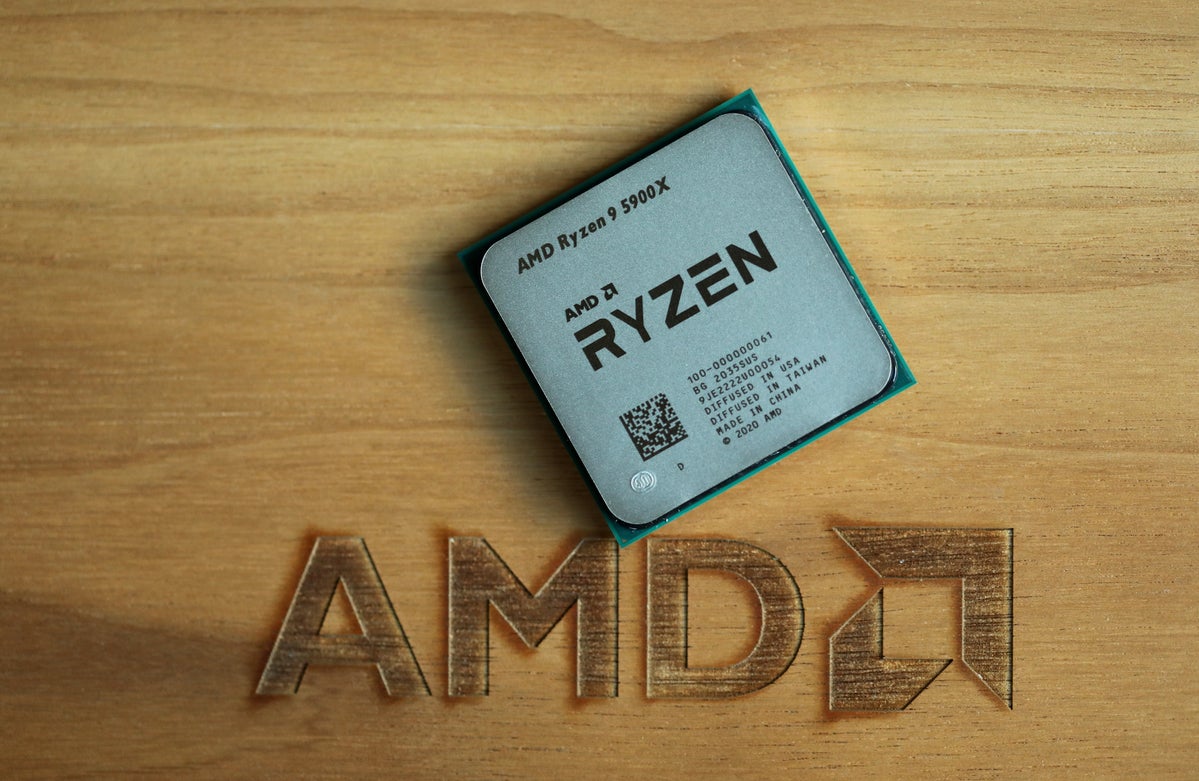 Gordon Mah Ung
Gordon Mah Ung Intel's 11th-gen Rocket Lake was announced this March, with 18 different 11th-gen Rocket-Lake S processors. They range from the Core i5-11400T (6 cores/12 threads, 1.3GHz dishonourable time to 3.7GHz turbo, 35W TDP) to the Core i9-11900K (8 cores/16 duds, 3.5GHz base time to 5.3GHz turbo, 125W TDP). Rocket Lake-S uses Intel's Cypress Cove CPU designs, originally optimized for 10nm. However, Roquette Lake is stacked on 14nm instead, qualifying information technology to ogdoad cores.
None of the untried Rocket Lake-S chips are members of the Kernel i3 family. Instead, Intel launched a "invigorated" 10th-gen Comet Lake-S lineup that includes Core i3 and Pentium processors.
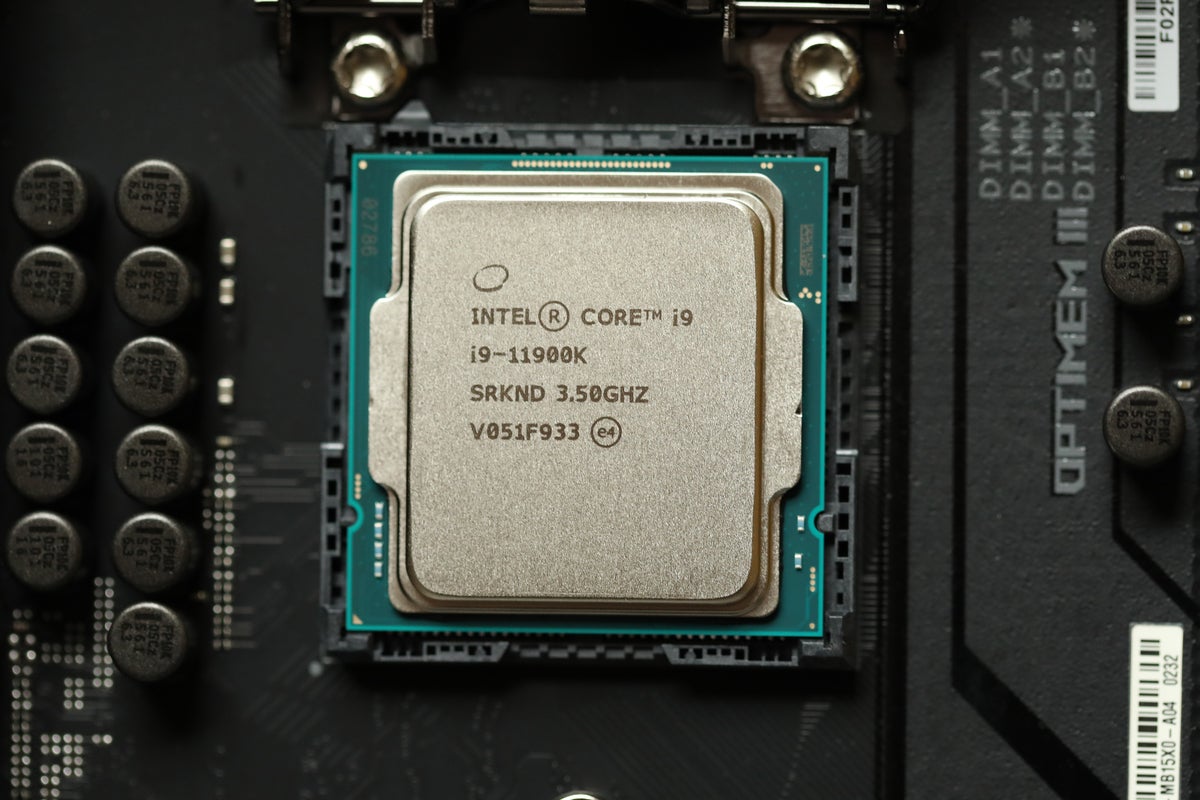 Gordon Mah Ung
Gordon Mah Ung Intel's 11th-gen Rocket engine Lake-S chips use Intel's existing Socket LGA 1200. This means the chip will be converse-compatible with present 400-serial publication motherboards, though with a bump to DDR4-3200 retentiveness and support for PCIe 4.0. The intense news is that Intel's next desktop chip, Alder Lake, may transmutation to a original, incompatible LGA 1700 socket.
Here's PCWorld's Core i9-11900K review.
Price and handiness: Intel wins… maybe
The global pandemic, spherical semiconductor manufacturing issues, and frantic demand for PCs and semiconductors have made accessibility almost a mean solar day-away-day concern. AMD's Ryzen 5000 was plagued by shortages almost as soon as it was declared; it's probably too presently to say whether Intel's Rocket Lake-S will do the same.
Here are the MSRPs for AMD's Ryzen 5000:
- Ryzen 9 5950X (16 cores/32 threads): $799
- Ryzen 9 5900X (12 cores/24 threads): $549
- Ryzen 7 5800X (8 cores/16 threads): $449
- Ryzen 5 5600X (6 cores/12 togs): $299
At wardrobe time, we found that supplies of AMD's Ryzen 5900X and 5950X were either largely sold out or priced at various hundred dollars higher up their MSRPs. However, we were able to find sites offering the cheaper Ryzen 7 5800X at Oregon near the $449 retail price, such as NeweggRemove not-product link. The Central processor market has been so roiled by enceinte need and limited supply, however, that handiness hindquarters change on a daylight-aside-day basis.
Here are the MSRPs for Intel's Rocket Lake-S. More inside information of the speeds and other characteristics dismiss be found in our underivative story of the Skyrocket Lake-S launch. Think back, the "K" chips are unlocked for overclocking, while the "F" series chips don't bear an integrated GPU and will have to be utilised with a discrete graphics fleck. Intel's "T" series processors are low-power offerings.
- Core i9-11900K (8 cores/16 threads): $539
- Core i9-11900KF (8 cores/16 threads): $513
- Core i9-11900 (8 cores/16 threads): $439
- Core group i9-11900F (8 cores/16 threads): $422
- Core i9-11900T (8 cores/16 threads): $439
- Core i7-11700K (8 cores/16 threads): $399
- Core i7-11700KF (8 cores/16 duds): $374
- Core i7-11700 (8 cores/16 threads): $323
- Core i7-11700 (8 cores/16 threads): $298
- Core i7-11700T (8 cores/16 threads): $323
- Inwardness i5-11600K (6 cores/12 threads): $262
- Core i5-11600KF (6 cores/12 duds): $237
- Inwardness i5-11600 (6 cores/12 threads): $213
- Core i5-11600T (6 cores/12 threads): $213
- Core i5-11500 (6 cores/12 duds): $192
- Core i5-11500T (6 cores/12 threads): $192
- Nucleus i5-11400 (6 cores/12 duds): $182
- Core i5-11400F (6 cores/12 duds): $157
- Core i5-11400T (6 cores/12 threads): $182
On theme, AMD clearly offers more performance in terms of cores and threads. But if you tail end't find a new Ryzen, does that matter? What we don't know is whether the newly-minted Rocket Lake-S chips will be equally rugged to find. (Antonline has been vocal music in that the retail merchant has the Core i5-11500, Inwardness i5-11600K, Core i7-11700, and the Core I7-11700K processor available for pre-order.)
It's possible that for this generation, AMD and Intel will swap their traditional roles. Up until a some years past, AMD offered lower public presentation—but you could leastwise incu an AMD chip to buy. Nowadays, AMD is claiming the performance throne—but selling out of many of its chips almost immediately. We'll have to see whether Intel's broad, diverse, 11th-gen offering helps it win the PC mart.
Power: AMD clearly wins
The thermal design power (TDP) numbers pool tell the fib: 105W for the Ryzen 9 5950X, and 125W for the Heart and soul i9-11900K. But we tried and true it anyway.
Here, the story of the two processors is a peltate one: If you run an application that taxes every Mainframe core of either processor, AMD's Ryzen 9 5950X essentially uses half the superpowe of Intel's Rocket Lake-S chip. That's an improbably stark difference.
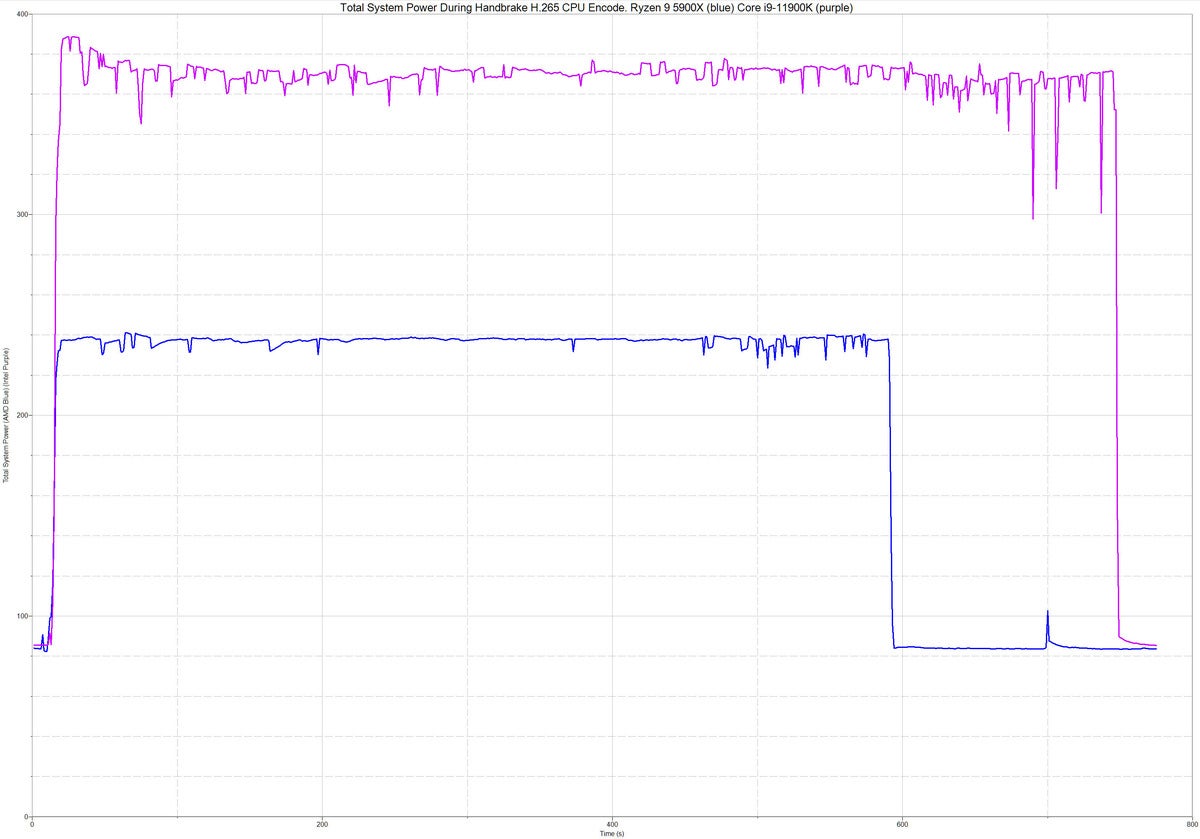 IDG
IDG When operative the Handbrake transcoding application, the difference between the two processors is stark. The Ryzen 9 5900X power consumption is in blue, while the Intel Essence i9-11900K is in purple.
In gaming, however, the crack narrows. Note that we'atomic number 75 comparing the overall system power of the two desktop PCs, rather than trying to isolate the power used up just by the CPU. Still, this would also be true of any system you'd run, too.
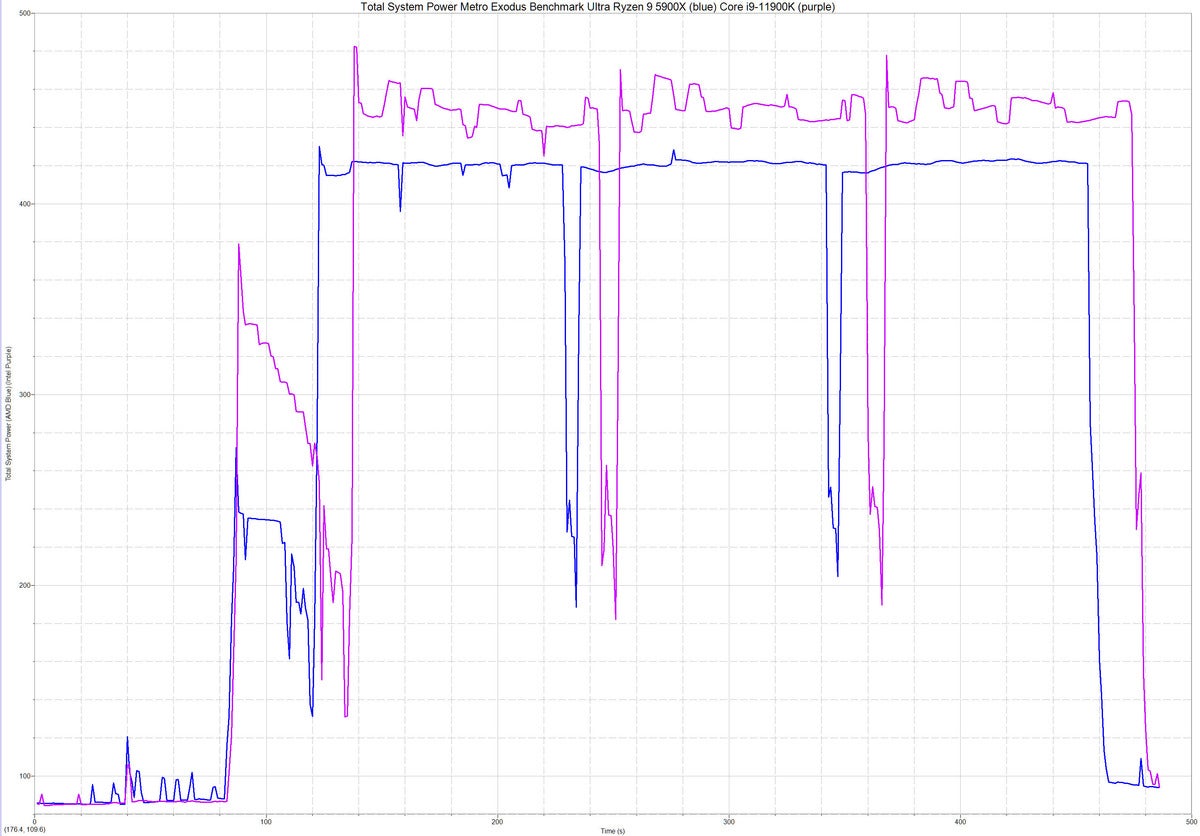 IDG
IDG When gaming (Metro: Last Light was victimized here) the discrepancy in power consumption motionless favors AMD, though less so than before.
For the plangent details, be sure and cheque our power comparison of AMD's Ryzen 5000X and Intel's Rocket Lake S chip. Total, the winner, in terms of power, is AMD's Ryzen 5000 silicon chip.
Public presentation: It depends
The ongoing battle between AMD and Intel toilet often see-saw back and away, depending upon which vender has the latest chip. In this case, AMD's Ryzen 5000 processor is about five months emeritus, compared to Intel's brand-new 11th-gen CORE i9-11000K. Until at once, that's meant we've been forced to equate Intel's "Comet Lake" 10th-gen Core chips against the in style Ryzen 5000 chips.
Alas, Intel's fledgeling does not reclaim crow rights. According to our testing, certain applications will show up decided wins for AMD's Ryzen, while others give the (usually slight) edge to Intel. Piece you'll have to read our full Core i9-11000K review to decide who landed the deciding shove along, we can record you a sneak peek of our head-to-head gaming showdown to help you decide. Keep in mind that we're comparing AMD's Ryzen 9 5900X to Intel's Core i9-11000K—non the Ryzen 9 5950X, which at an effective price of $1,200 at press timeRemove non-cartesian product link is essentially unaffordable for many.
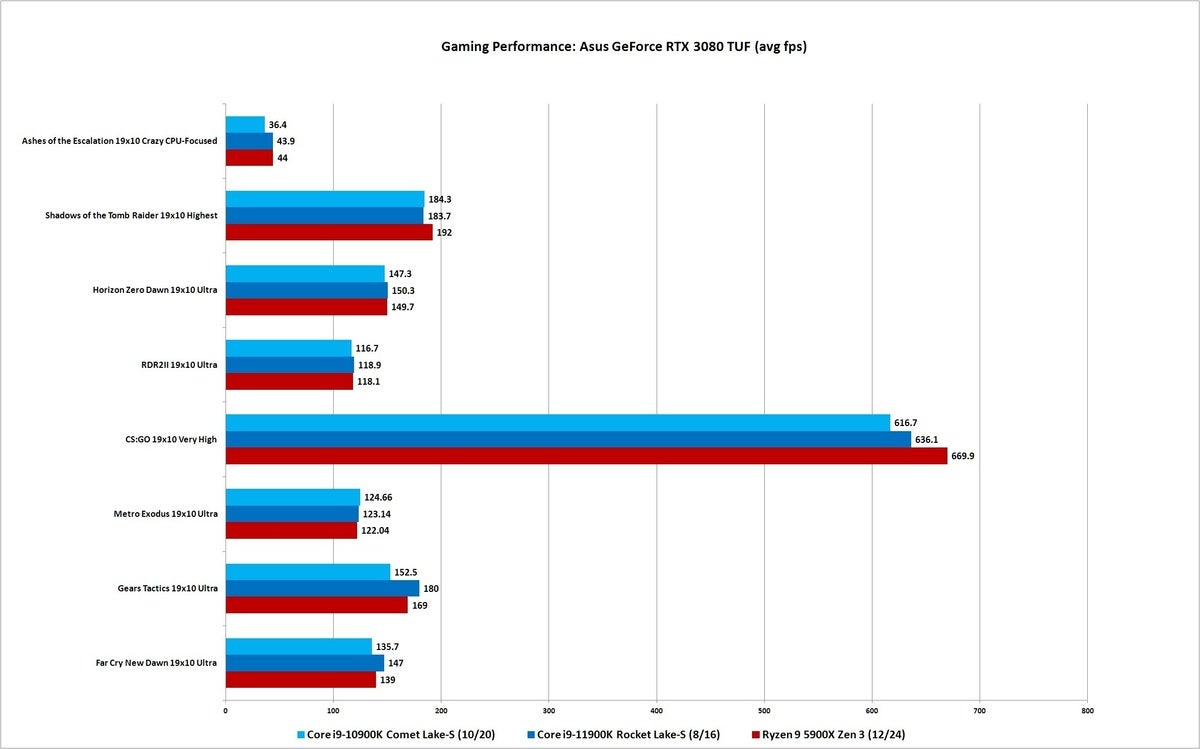 IDG
IDG Atomic number 3 you toilet see, the rival betwixt Intel Rocket Lake-S (and its Comet Lake predecessor) and Ryzen 5000 is close in gaming applications. (Longer bars indicate better performance.)
To date, Intel's latest have improved over the prior generation in carrying into action, but still meantime behind AMD's in many respects. Here's how we summed in the lead the current state of represent:
"Intel's 11th-gen chip is generally faster than its 10th-gen ancestor by decent margins. While Ryzen 5000 has generally light-emitting diode Intel's old 10th-gen chip in gaming, the 11th-gen Core leastwise puts Intel back into the conversation."
Rocket Lake vs. Ryzen 5000: Which should you buy?
We've laid out a number of considerations to think about when determinant which of these new chips to buy. First,lav you corrupt each C.P.U.? The panel's tranquillise out on that. If it's faithful that Intel's Alder Lake and subsequent chips leave move to a new, incompatible socket, then making a Rocket Lake-S investment offers no Bob Hope for an upgrade. The power question clearly favors AMD—and your electricity bill! In the end, there's execution, which ends up existence a nigher race than we power have otherwise expected.
If there were a clear-cut winner, we'd name IT. Differently, the choice 'tween the two processors comes down to crisp accessibility—and your priorities. We can say this for certain, nevertheless: Competition is in effect.
Note: When you purchase something after clicking links in our articles, we may earn a small commission. Read our affiliate colligate policy for more inside information.
Every bit PCWorld's senior editor, Mark focuses along Microsoft news and chip technology, among strange beats. He has formerly written for PCMag, BYTE, Slashdot, eWEEK, and ReadWrite.
Source: https://www.pcworld.com/article/394309/intel-rocket-lake-s-vs-amd-ryzen-5000-which-should-you-buy.html
Posted by: terrellfolody.blogspot.com


0 Response to "Intel Rocket Lake-S vs AMD Ryzen 5000: Which should you buy? - terrellfolody"
Post a Comment